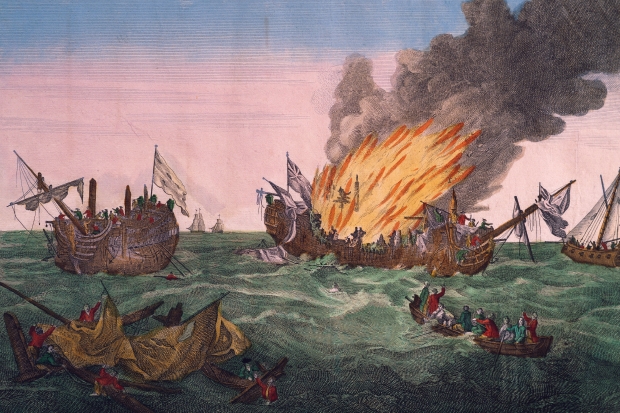Military history is more popular than respected. It is not hard to see why. It is masculine history, a trifecta of logistical planning, technical detail and violent death. It shows the value of hierarchy and duty, sacrifice and patriotism — disgraceful notions which the young and impressionable might be inspired to emulate. And,with its sudden twists from tedium to danger and its tidily destructive conclusions, it has tight plots.
One way to make civilian history as exciting is, as Eric Hobsbawm showed, to turn it into a false kind of fiction, true neither to the facts nor the life. Another, as N.A.M. Rodger did in The Wooden World, his ‘anatomy’ of the Georgian navy, is to integrate military history with political and social history. Sam Willis’s The Struggle for Sea Power has something of the Rodger touch: a ‘liquid history’ that integrates water and land, war and politics, global strategies and provincial societies. It is highly entertaining and readable, too.
In the liquid perspective, the colonies were not so much lost to the zeal of the rebels as mislaid by the incompetence of the imperial administration. The London government imposed taxes, and then a blockade against tax evasion, but there were too many creeks and bays on the American coast, and too many collaborators looking to profit along with the tax-evaders. Before the first shots were fired on land at Lexington in April 1775, the Americans had already bested the world’s most powerful navy — and without launching a fleet of their own. More than 90 per cent of the powder used by the Americans in the first two and a half years of their revolt had been smuggled in, mostly from the Caribbean, and often from unscrupulous British merchants.
As a regular visitor to Boston’s Museum of Fine Arts, I knew that Paul Revere was not a jockey by profession, but a silversmith. I did not know that Revere’s night ride to Concord began with him sneaking across the Charles River in a little boat. With Boston under military rule, water traffic was banned; before Revere mounted his horse at Charlestown, he had drifted silently under the guns of the 64-gun Somerset. Nor did I know that the British troops who were harried from Lexington to Charlestown had begun their miserable journey with a similar crossing, which left them ‘shivering in the Cambridge marshes, wet to their waistbands’ as they waited for the Navy to row across their supplies.
The Americans’ first liquid campaign predated the founding of their navy. In late 1775, Benedict Arnold, usually remembered as a traitor to the revolution, led an amphibious invasion of Canada. More than 1,000 men sailed ‘dirty coasters and fish boats’ up the lakes and rivers to Quebec. After losing most of his ammunition and half of his men on the way, Arnold was repulsed from Quebec by a garrison of sailors from HMS Isis. The colonists gave up on attacking northwards; Canada remained in the British empire.
The entry of France in 1778 turned a colonial civil war into an imperial, Atlantic war. The Royal Navy was split between blockading the Americans, defending the English Channel, and fighting for the Caribbean. If Britain could no longer win the war on land, would the rebels have won their decisive land victory at Yorktown in 1781 without liquid assistance from France?
French ships had already buttressed Washington’s Continental Army, by landing the Comte de Rochambeau’s troops in 1780. Now, the French West Indies’ fleet under the Comte de Grasse cut off Cornwallis’s maritime escape route from Yorktown, by defeating the Royal Navy at the Battle of the Chesapeake. The French then landed more soldiers, as well as 500,000 pesos, raised in Cuba by France’s Spanish ally, to pay for the siege and the Continental Army’s payroll.
Rodney’s revenge, defeating de Grasse at the Battle of the Saintes (1782), secured the West Indies but could not alter the outcome on the continental mainland. The Royal Navy could win battles, but not the war; the French navy lost battles, but won the war for the Americans. As everyone knows, the last shot of the American War of Independence was fired between British and French ships in the Bay of Bengal, at the Battle of Cuddalore on 20 June 1783.
Sam Willis is an enthusiastic sailor, an expert researcher, and a television presenter. Metaphors are spliced like mainbraces, the language of the lower deck gives a salty tang to the narrative, and the English language is brutally keelhauled — the Battle of the Chesapeake is a ‘heavyweight slugfest’. Still, The Struggle for Sea Power is careful in research and analysis, and a strong example of military history at its most ambitious: a ‘liquid history’ that, diluting the familiar, landlubbing account, globalises the politics of the American Revolution.






Comments